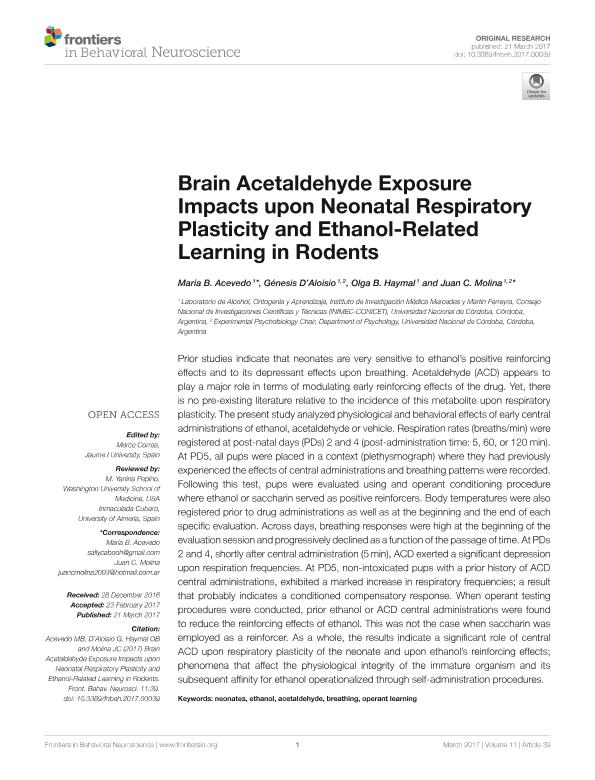Artículo
Brain acetaldehyde exposure impacts upon neonatal respiratory plasticity and ethanol-related learning in rodents
Fecha de publicación:
21/03/2017
Editorial:
Frontiers Research Foundation
Revista:
Frontiers in Behavioral Neuroscience
ISSN:
1662-5153
Idioma:
Inglés
Tipo de recurso:
Artículo publicado
Clasificación temática:
Resumen
Prior studies indicate that neonates are very sensitive to ethanol’s positive reinforcing effects and to its depressant effects upon breathing. Acetaldehyde (ACD) appears to play a major role in terms of modulating early reinforcing effects of the drug. Yet, there is no pre-existing literature relative to the incidence of this metabolite upon respiratory plasticity. The present study analyzed physiological and behavioral effects of early central administrations of ethanol, acetaldehyde or vehicle. Respiration rates (breaths/min) were registered at post-natal days (PDs) 2 and 4 (post-administration time: 5, 60, or 120 min). At PD5, all pups were placed in a context (plethysmograph) where they had previously experienced the effects of central administrations and breathing patterns were recorded. Following this test, pups were evaluated using and operant conditioning procedure where ethanol or saccharin served as positive reinforcers. Body temperatures were also registered prior to drug administrations as well as at the beginning and the end of each specific evaluation. Across days, breathing responses were high at the beginning of the evaluation session andprogressively declinedas a function of the passage of time. At PDs 2 and 4, shortly after central administration (5min), ACD exerted a significant depression upon respiration frequencies. At PD5, non-intoxicated pups with a prior history of ACD central administrations, exhibited a marked increase in respiratory frequencies; a result that probably indicates a conditioned compensatory response. When operant testing procedures were conducted, prior ethanol or ACD central administrations were found to reduce the reinforcing effects of ethanol. This was not the case when saccharin was employed as a reinforcer. As a whole, the results indicate a significant role of central ACD upon respiratory plasticity of the neonate and upon ethanol’s reinforcing effects; phenomena that affect the physiological integrity of the immature organism and its subsequent affinity for ethanol operationalized through self-administration procedures.
Palabras clave:
Acetaldehyde
,
Breathing
,
Ethanol
,
Neonates
,
Operant Learning
Archivos asociados
Licencia
Identificadores
Colecciones
Articulos(INIMEC - CONICET)
Articulos de INSTITUTO DE INV. MEDICAS MERCEDES Y MARTIN FERREYRA
Articulos de INSTITUTO DE INV. MEDICAS MERCEDES Y MARTIN FERREYRA
Citación
Acevedo, María Belén; D'aloisio, Génesis; Haymal, Olga Beatriz; Molina, Juan Carlos; Brain acetaldehyde exposure impacts upon neonatal respiratory plasticity and ethanol-related learning in rodents; Frontiers Research Foundation; Frontiers in Behavioral Neuroscience; 11; 39; 21-3-2017; 1-12
Compartir
Altmétricas




